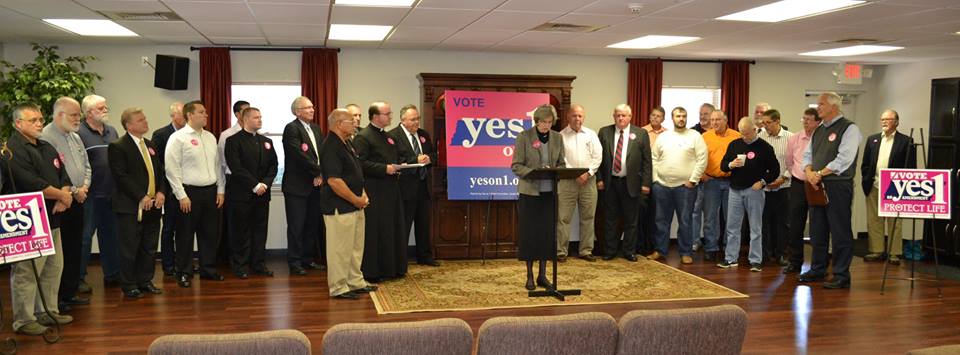U.S. high court refuses to hear pro-abortion challenge of 2014 vote to amend state Constitution
By Bill Brewer
The United States Supreme Court has refused to hear a legal challenge to Tennessee’s constitutional amendment eliminating the right to an abortion.
Pro-life supporters across the state cheered the Oct. 1 decision, which almost certainly brings to an end appeals by pro-abortion groups to overturn Amendment 1.
Amendment 1, which was ratified by 52.6 percent of Tennessee voters in the November 2014 election, added language to the Tennessee Constitution empowering the state legislature to enact, amend, or repeal state statutes on abortion.
“Today’s announcement is cause for great celebration among Tennessee’s pro-life movement,” said Brian Harris, president of Tennessee Right to Life, a statewide pro-life advocacy group that worked with legislators to get Amendment 1 on the November 2014 ballot and then led the campaign statewide for its passage.
“This is the culmination of many years’ work, and Tennessee Right to Life is especially grateful to our state’s voters, legislators, election officials, and (Tennessee) Attorney General (Herbert) Slatery for staying the course. The people’s voices have been heard, and their votes have been counted. Now we have to continue to work for the day when every life is again protected by the laws of our state and nation,” Mr. Harris continued.
The amendment was placed on the ballot by the Tennessee General Assembly, and as a legislatively referred constitutional amendment, Amendment 1 had to earn a majority of votes of those voting on the amendment as well as a majority of votes from those casting ballots for governor to take effect.
The amendment to Tennessee’s constitution was identified as a critical moral and life issue by the dioceses of Knoxville, Nashville, and Memphis, as well as other religious denominations around the state.
Support for the measure from the Catholic Church and other churches around the state was cited by political analysts as a key reason Amendment 1 passed.
Supporters of the amendment say it neutralizes the extreme interpretation taken by the Tennessee Supreme Court in 2000 in which that court declared that the state constitution guarantees abortion rights above and beyond what the U.S. Constitution provides in the Roe v. Wade decision. Supporters also maintain that passage of Amendment 1 restores to voters the “life” decisions taken from them by the state Supreme Court decision.
Eight voters opposing Amendment 1, including the former board chair for Planned Parenthood of Middle and East Tennessee, filed suit in federal court on Nov. 7, 2014, to challenge the voting results.
They claimed the process used by the state to tally votes was unconstitutional. The state of Tennessee then asked the federal court to dismiss the claim, arguing that the method of counting votes was consistent with the state Constitution. Attorneys representing the state argued that the method used to count signatures was based on interpretation of the Constitution, legislative intent, and longstanding practice. However, the state’s request was denied.
In a separate decision, on April 21, 2016, a Williamson County judge ruled in favor of the state, declaring that votes from voters who didn’t cast ballots in the gubernatorial race could still be counted for the amendment. A day later, federal judge Kevin Sharp ruled against the state in the original federal suit, deciding that only the votes of voters who also cast ballots for governor could be counted. This decision superseded the Williamson County decision. Judge Sharp then ordered the state to recount the election results from 2014, raising the possibility that Amendment 1 could be invalidated.
The case was appealed to the 6th U.S. Circuit Court of Appeals and in January of this year the 6th Circuit reversed the lower-court order, ruling that Amendment 1 is legally binding.
Tennessee’s pro-abortion leaders and organizers asked the U.S. Supreme Court to take up their challenge of the people’s pro-life vote on Amendment 1. By declining their request, the lower court’s decision remains in effect and affirms Amendment 1.
“Although Planned Parenthood and their fellow pro-aborts poured millions of dollars into our state to defeat this life-saving amendment, it was the will of God and the work of His people that ultimately served to get the amendment passed. We were not surprised that these people who represent an abortion industry founded in evil would come to our state and lie to our voters. We were, however, saddened to see the depths to which they would go to deceive God-fearing people,” said Stacy Dunn, executive director of the Knox County chapter of Tennessee Right to Life who also served as East Tennessee regional coordinator for the 2014 Yes on 1 campaign.
Will Brewer, a Knoxville lawyer and legislative liaison with Tennessee Right to Life, said the Supreme Court decision likely means Amendment 1 is now settled law in Tennessee, and voters can feel reassured that their voices were heard without third-party interference.
Mr. Brewer said that unless the pro-abortion plaintiffs come up with another claim of action, “which is doubtful and should have been done by now, this is the end of the appeals process.”
“Amendment 1 states that there is no right to an abortion in the Tennessee Constitution. It follows the will of Tennessee voters who voted in favor of Amendment 1 in a 2014 statewide election. It also overturns a liberal Tennessee Supreme Court decision that held that there is a fundamental right to abortion implied in the Tennessee Constitution,” Mr. Brewer said.
“This victory is due in large part to the pro-life Tennessee voters who rallied and prayed and advocated for this legislative victory. It also is due in large part to the Tennessee Attorney General’s office, which defended this all the way to the U.S. Supreme Court,” Mr. Brewer added.

